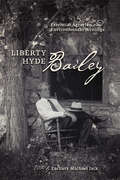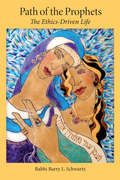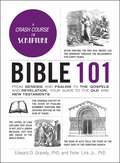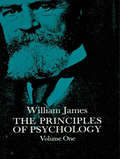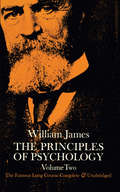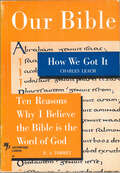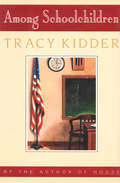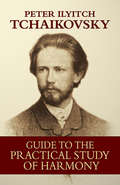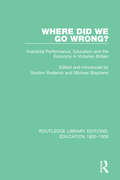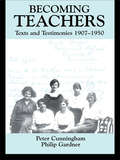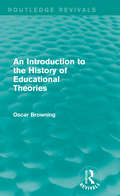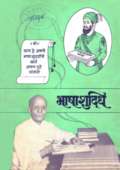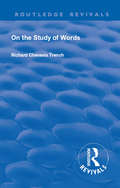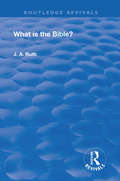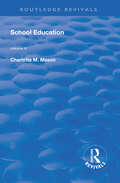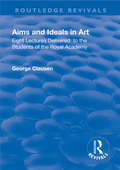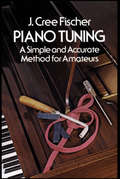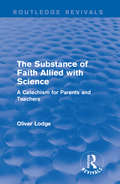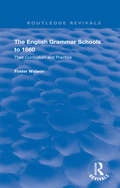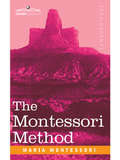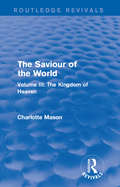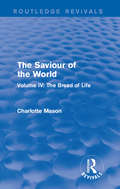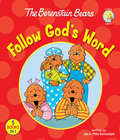- Table View
- List View
Liberty Hyde Bailey: Essential Agrarian and Environmental Writings
by Liberty Hyde Bailey"Nature-study not only educates, but it educates nature-ward; and nature is ever our companion, whether we will or no. Even though we are determined to shut ourselves in an office, nature sends her messengers. The light, the dark, the moon, the cloud, the rain, the wind, the falling leaf, the fly, the bouquet, the bird, the cockroach-they are all ours. If one is to be happy, he must be in sympathy with common things. He must live in harmony with his environment. One cannot be happy yonder nor tomorrow: he is happy here and now, or never. Our stock of knowledge of common things should be great. Few of us can travel. We must know the things at home."—from "The Meaning of the Nature-study Movement""To feel that one is a useful and cooperating part in nature is to give one kinship, and to open the mind to the great resources and the high enthusiasms. Here arise the fundamental common relations. Here arise also the great emotions and conceptions of sublimity and grandeur, of majesty and awe, the uplift of vast desires—when one contemplates the earth and the universe and desires to take them into the soul and to express oneself in their terms; and here also the responsible practices of life take root."—from The Holy EarthBefore Wendell Berry and Aldo Leopold, there was the horticulturalist and botanist Liberty Hyde Bailey (1858–1954). For Wendell Berry, Bailey was a revelation, a symbol of the nature-minded agrarianism Berry himself popularized. For Aldo Leopold, Bailey offered a model of the scholar-essayist-naturalist. In his revolutionary work of eco-theology, The Holy Earth, Bailey challenged the anthropomorphism—the people-centeredness—of a vulnerable world. A trained scientist writing in the lyrical tradition of Emerson, Burroughs, and Muir, Bailey offered the twentieth century its first exquisitely interdisciplinary biocentric worldview; this Michigan farmer's son defined the intellectual and spiritual foundations of what would become the environmental movement.For nearly a half century, Bailey dominated matters agricultural, environmental, and scientific in the United States. He worked both to improve the lives of rural folk and to preserve the land from which they earned their livelihood. Along the way, he popularized nature study in U.S. classrooms, lobbied successfully for women's rights on and off the farm, and bulwarked Teddy Roosevelt's pioneering conservationism.Here for the first time is an anthology of Bailey's most important writings suitable for the general and scholarly reader alike. Carefully selected and annotated by Zachary Michael Jack, this book offers a comprehensive introduction to Bailey's celebrated and revolutionary thinking on the urgent environmental, agrarian, educational, and ecospiritual dilemmas of his day and our own. Culled from ten of Bailey's most influential works, these lyrical selections highlight Bailey's contributions to the nature-study and the Country Life movements. Published on the one-hundredth anniversary of Bailey's groundbreaking report on behalf of the Country Life Commission, Liberty Hyde Bailey: Essential Agrarian and Environmental Writings will inspire a new generation of nature writers, environmentalists, and those who share with Bailey a profound understanding of the elegance and power of the natural world and humanity's place within it.
Path of the Prophets: The Ethics-Driven Life
by Rabbi Barry L. SchwartzIlluminating the ethical legacy of the biblical prophets, Path of the Prophets identifies the prophetic moment in the lives of eighteen biblical figures and demonstrates their compelling relevance to us today. While the Bible almost exclusively names men as prophets, Rabbi Barry L. Schwartz celebrates heroic, largely unknown biblical women such as Shiphrah, Tirzah, and Hannah. He also deepens readers’ interpretations of more familiar biblical figures not generally thought of as prophets, such as Joseph, Judah, and Caleb. Schwartz introduces the prophets with creative, first-person retellings of their decisive experiences, followed by key biblical narratives, context, and analysis. He weighs our heroes’ and heroines’ legacies—their obstacles and triumphs—and considers how their ethical examples live on; he guides us on how to integrate biblical-ethical values into our lives; and he challenges each of us to walk the prophetic path today.
Bible 101: From Genesis and Psalms to the Gospels and Revelation, Your Guide to the Old and New Testaments (Adams 101)
by Dr. Edward D. Gravely Dr. Peter Link Jr.A comprehensive, easy-to-understand guide to the ins and outs of the Old and New Testaments.Get a crash course in the most beloved book of all time—the bible. Simplifying the words and concepts of the bible doesn&’t have to be an overwhelming undertaking. From Exodus to the prophets and the psalms and revelation, Bible 101 gives you a basic overview of every part of this important book. Written in easy-to-understand language, Bible 101 offers a fascinating—and memorable—glimpse at the sacred stories, traditions, and doctrines that appear in the New and Old Testaments. No matter what your familiarity with the bible is currently, Bible 101 can help you understand the word of God.
The Principles of Psychology, Vol. 1
by William JamesVolume 1 of the famous long course, complete and unabridged. Stream of thought, time perception, memory, experimental methods -- these are only some of the concerns of a work that was years ahead of its time and is still valid, interesting and useful. Total in set: 94 figures.
The Principles of Psychology, Vol. 2
by William JamesThis is the first inexpensive edition of the complete Long Course in Principles of Psychology, one of the great classics of modern Western literature and science and the source of the ripest thoughts of America’s most important philosopher. As such, it should not be confused with the many abridgements that omit key sections.The book presents lucid descriptions of human mental activity, with detailed considerations of the stream of thought, consciousness, time perception, memory, imagination, emotions, reason, abnormal phenomena, and similar topics. In its course it takes into account the work of Berkeley, Binet, Bradley, Darwin, Descartes, Fechner, Galton, Green, Helmholtz, Herbart, Hume, Janet, Kant, Lange, Lotze, Locke, Mill, Royce, Schopenhauer, Spinoza, Wundt, and scores of others. It examines contrasting interpretations of mental phenomena, treating introspective analysis, philosophical interpretations, and experimental research.Although the book originally appeared nearly 75 years ago, it remains unsurpassed today as a brilliantly written survey of William James’ timeless view of psychology.
Good-natured Man With Introduction And Notes
by Goldsmith Edited By K. Deighton.SHORTLY after the publication of The Vicar of Wakefield, in 1766, Goldsmith began to think of writing a comedy, and in 1767 The Good-Natured Man was submitted for Garrick’s approval. Garrick, however, insisted upon great alterations being made, and Goldsmith declining to comply, the comedy was declined. It was, however, accepted by George Colman, the elder, then manager of Covent Garden Theatre, and there produced in January 1768, the Prologue being written by Dr Johnson. The result was fairly suc-cessful, though the scene of the bailiffs was objected to as being “ low,” and was afterwards cut out on the stage, to be restored, however, shortly afterwards, when the play was published. The Good-Natured Man ran for ten nights, and Goldsmith’s share of the profits was £400. A further sum of £100 was received by him from the publication of the pla
Our Bible: How We Got It and Ten Reasons Why I Believe the Bible is the Word of God (Colportage Library #64)
by Charles Leach R. A. TorreyDr. Leach answers these pertinent questions: Is the Bible really true? Where did the Bible come from? Has our Bible suffered change through the years? When were the books of the New Testament collected? Did Christ use our Old Testament? Dr. Leach first discusses the New Testament, then the Old, and finally traces the history of our English Bible. Dr. R.A. Torrey concludes with ten reasons given to prove that the Bible is the Word of God.
Our Bible: How We Got It and Ten Reasons Why I Believe the Bible is the Word of God (Colportage Library #64)
by Charles Leach R. A. TorreyDr. Leach answers these pertinent questions: Is the Bible really true? Where did the Bible come from? Has our Bible suffered change through the years? When were the books of the New Testament collected? Did Christ use our Old Testament? Dr. Leach first discusses the New Testament, then the Old, and finally traces the history of our English Bible. Dr. R.A. Torrey concludes with ten reasons given to prove that the Bible is the Word of God.
Among Schoolchildren
by Tracy KidderThe Pulitzer Prize–winning author&’s classic, &“brilliantly illuminated&” account of education in America (TheNew York Times Book Review). Mrs. Zajac is feisty, funny, and tough. She likes to call herself an &“old-lady teacher.&” (She is thirty-four.) Around Kelly School, she is infamous for her discipline: &“She is mean, bro,&” says one of her students. But children love her, and so will the reader of this extraordinarily moving book by the Pulitzer Prize–winning author of House and The Soul of a New Machine. Tracy Kidder spent nine months in Mrs. Zajac&’s fifth-grade classroom in a depressed area of Holyoke, Massachusetts. Living among the twenty schoolchildren and their indomitable teacher, he shared their joys, catastrophes, and small but essential triumphs. His resulting New York Times bestseller is a revelatory and remarkably poignant account of an inner-city school that &“erupts with passionate life,&” and a close-up examination of what is wrong—and right—with education in America (USA Today). &“More than a book about needy children and a valiant teacher; it is full of the author&’s genuine love, delight and celebration of the human condition. He has never used his talent so well.&” —The New York Times
Guide to the Practical Study of Harmony (Dover Books on Music)
by Peter Ilyitch TchaikovskyWritten during Tchaikovsky’s years as professor at the renowned Moscow Conservatory, this volume presents a clear and thorough introduction to the study of harmony. The great Russian composer expounded upon his views of music while he was in the full flower of his creative powers, offering students a chance to learn the discipline’s fundamentals from one of its great masters. Out of print for decades and exceedingly rare in its original edition, Tchaikovsky’s Guide to the Practical Study of Harmony possesses an intrinsic historical interest, yet remains as useful and instructive today as it was a century ago. A complete course in writing music, this excellent manual features numerous examples and exercises. It functions equally well as a classroom text, an adjunct to private instruction, or as a guide to individual musicians.
Where Did We Go Wrong?: Industrial Performance, Education and the Economy in Victorian Britain (Routledge Library Editions: Education 1800-1926 #12)
by Gordon Roderick Michael StephensThis series of edited papers, first published in 1981, examines Britain’s industrial and commercial performance in the 19th and 20th centuries against the background of the development of state education. The performance of certain key 19th century manufacturing industries are analysed and the reasons for their relative decline in the face of foreign competition is assessed. This title will be of interest to students of history and education.
Becoming Teachers: Texts and Testimonies, 1907-1950 (Woburn Education Series)
by Peter Cunningham Philip GardnerThere is an extraordinary gap in the published history of schooling in the twentieth century. Nowhere is the voice of the teacher, telling his or her own story, extensively to be heard. This book, drawing not only upon the official documentary record, but also upon the previously untapped recollections of more than 100 former classroom teachers, aims to fill this gap. In Becoming Teachers, the nation's teachers from more than half a century ago tell what twentieth century education has looked like and felt like from their side of the classroom. The book concentrates particularly on the years between the end of the First World War and the passing of the landmark 1944 Education Act. All of the former state school teachers whose testimony stands at the centre of the book began their teaching careers in this period, and most completed the bulk of their classroom teaching in these years.Oral testimony is set alongside more conventional documentary sources and thematic analysis and individual life histories are brought together. In this respect, the work will break new ground in terms of its methodological approach as well as in terms of its substantive historical concerns.
An Introduction to the History of Educational Theories (Routledge Revivals)
by Oscar BrowningAn Introduction to the History of Educational Theories, first published in 1881, offers a comprehensive overview of the most notable approaches to education throughout Western history, from Athens and Rome to the Victorian public school. Exploring not only the still famous theories of Plato and Aristotle, this work also touches on techniques in education which are either no longer prevalent – Roman Oratory, the Jesuits – or in some cases were never widely adopted or appreciated: John Milton, for example. This title will be of value to those intrigued by the potential of past attitudes for present-day application, as well as to those unconvinced by contemporary approaches.
Bhashashuddhi - Novel: भाषाशुद्धी - कादंबरी
by Shri. Balarao Savarkarया पुस्तकांत वीर सावरकरांच्या भाषाशुद्धि या विषयावरील काही निवडक लेखांचे पुनर्मुद्रण करीत आहों. ह्यांतील बहुतेक लेखांचे पुस्तकरूपाने हे तिसरे पुनर्मुद्रण आहे यावरून या लेखांविषयींची मराठी वाचकवर्गाला वाटणारी अभिरुचि आणि आवश्यकता व्यक्त होत आहे. वीर सावरकर लिखित भाषा शुद्धी या पुस्तकामध्ये हिंदी, मराठी, संस्कृत, अरबी, फारशी, इंग्रजी, परराष्ट्रीय, उर्दू, पारशी, इत्यादी भाषांचे महत्व व त्या भाषांचे एकमेकांशी असलेले वेगवेगळे अर्थ आणि एकमेकांमधील फरक कसा आहे हे सविस्तर पणे दाखवले आहे.
Revival: On the Study of Words (Routledge Revivals)
by Richard Chenevix TrenchFirst published in 1904, this book contains the conclusions of a series of lectures exploring the moral and historical value of single words. The author argues that, just as wisdom and knowledge are discoverable in books, so too are these treasures to be found in individual words themselves.
What is the Bible? (Routledge Revivals)
by J.A. RuthFirst published in 1904, this volume questioned whether the Bible is in its entirety the literal Word of God. The author’s strong background in evangelical Christianity led them to question numerous theological experts and ministers on the topic and conclude that the Bible is as purely and entirely a human production as any other work of literature. Ruth argues instead that humanity’s knowledge of God has come about through developing the faculties with which God has endowed them and that the Bible is a history of humanity’s discovery of God. First considering whether the Bible can be considered the Word of God, the author moves on to cover topics including the evolution of Hebrew monotheism, the Bible canon, contraditions and miracles.
School Education: Volume Iii (Routledge Revivals)
by Charlotte M. MasonOriginally published in 1905, this book argues that the educational outlook was rather misty and depressing both at home and abroad. That science should be a staple of education, that the teaching of Latin, of modern languages, of mathematics, must be reformed, that nature and handicrafts should be pressed into service for the training of the eye and hand, that boys and girls must learn to write English and therefore must know something of history and literature; and, on the other hand, that education must be made more technical and utilitarian - these, and such as these, are the cries of expedience with which we take the field. But we have no unifying principle, no definte aim; in fact, no philosophy of education.
Revival: Eight lectures delivered to the students of the Royal Academy (Routledge Revivals)
by George ClausenGeorge Clausen delivers these eight lectures to the students of The Royal Academy of Arts about the aims and ideals of art. He includes the truth to nature and style within art and explores the imagination and taste in drawing and using colour.
Piano Tuning: A Simple and Accurate Method for Amateurs (Dover Books On Music: Piano)
by J. Cree FischerIf you have a note that has dropped in pitch, do you have to call in the tuner? A stuck key? Sympathetic rattle? Missing bridles? A broken hammer shank? An unglued ivory? The answer, in each case, is no: you can make all of these repairs yourself!This is the clearest and most complete book available for beginning tuners and amateur pianists. It explains all the basic processes practically and with model clarity. A non-musician can use this book without too much difficulty.You will learn how upright, grand, and square actions work, and how to take care of the smallest repairs — repairing stuck keys, poorly adjusted bottoms and capstans, crowded back checks, felts and leather on the hammers, hammer stems; softening damper and hammer felts; installing new bridles; eliminating "sympathetic rattle"; all with a minimum of tools and training.You will learn a professional method of tuning based on slightly flattened fifths, where only the octave and the upward fifth intervals are used. This is one of the easiest systems to learn, one capable of a great deal of control, and one perfectly suited to adjusting one or two keys. It is a tested method especially right for amateurs working without a teacher, and a method that trains the ear for other recommended systems. The author also explains "beats," the theory of the tempered scale, and useful experiments you can make with harmonic phenomena.If you want to experiment with tuning a piano, there is no better book to start with. It will help performers and teachers make occasional repairs and learn the structure and scale of the piano. Those who want to know how pianos work will find this book both clear and useful.
The Substance of Faith Allied with Science: A Catechism for Parents and Teachers (Routledge Revivals)
by Oliver LodgeOriginally published in 1907, this book provides information to parents and teachers wishing to teach their children about Christianity as well as science. Lodge details his fear of mandatory secularism in schools and advises how to instruct children in science without allowing any doubt of Christian doctrine and stresses the importance of reconciliation between religion and science for future generations. This title will be of interest to students of Education and Religion.
The English Grammar Schools to 1660: Their Curriculum and Practice (Routledge Revivals)
by Foster WatsonFirst published in 1908, this important work on the history of education traces the development of teaching in English Grammar Schools from the invention of printing up to 1660. It is not a history of the theories of educational reformers as to what should or should not be taught, but a history of the actual practices of the schools, of their curricula and of the differentiated subjects of instruction. The author relies heavily on the textbooks used in schools in the sixteenth and seventeenth centuries, in particular the ‘Ludus Literarius’ of John Brinsley and the ‘New Discovery of the Old Art of Teaching School’ of Charles Hoole, and makes free use of the School Statutes which state the express intention of the Founder as to what was to be taught. The period covered is one of great significance in which the Encyclopaedia of the medieval curriculum was abandoned for the modern practice of the differentiation of school subjects. The new knowledge of the Renaissance and the introduction of critical methods and of close analysis gave students a detailed knowledge which could not be fitted into the rigid confines of the medieval Encyclopaedia, while the invention of printing enormously facilitated the increase and spreading of text books for both teachers and pupils.
The Montessori Method
by Maria MontessoriThis groundbreaking classic of educational philosophy takes on urgent new necessity today, as "traditional" methods of early-childhood schooling seem to be failing us. Published in Italian in 1909 and first translated into English in 1912, these still-revolutionary theories focus on the individuality of the child and on nurturing her inherent joy of learning to create schools and other learning environments that are oriented on the child. Eschewing rote memorization and drilling, Montessori's method helps to foster abstract thinking and to fulfill a child's highest potential, emotionally, physically and intellectually. Parents from all walks of life will find the ideas herein immensely valuable.
The Saviour of the World: Volume III: The Kingdom of Heaven (Routledge Revivals)
by Charlotte M MasonThe Saviour of the World covers each incident and each saying in the Bible and converts them to either a single poem, blank verse or rhymed stanza, according to the subject. This volume, called The Kingdom of Heaven, was originally published in 1909. This book will be of interest to students of both religious studies and English literature.
The Saviour of the World: Volume IV: The Bread of Life (Routledge Revivals)
by Charlotte M MasonThe Saviour of the World covers each incident and each saying in the Bible and converts them to either a single poem, blank verse or rhymed stanza, according to the subject. This volume, called The Bread of Life, was originally published in 1910. This book will be of interest to students of both religious studies and English literature.
The Berenstain Bears Follow God's Word (Berenstain Bears/Living Lights)
by Jan BerenstainThis five-book collection of the highly popular Living Lights™ Berenstain Bears® stories provides children with an ideal gift they will enjoy for years to come. The biblical values, morals, and life lessons are invaluable for children throughout every stage of their lives.
